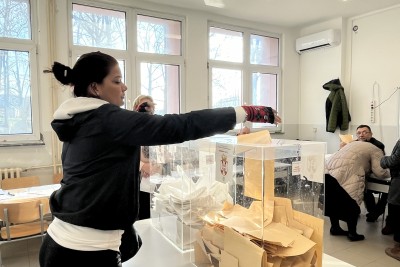International Observers Highlight Concerns in Serbia's Early Parliamentary Elections
In Serbia's early parliamentary elections, held amidst a politically and socially divided landscape, international observers have raised significant concerns about the fairness and integrity of the electoral process. The OSCE and the European Parliament expressed their criticism. The elections were marked by overwhelming advantages for the ruling party and the dominant involvement of the President, overshadowing the technical efficiency of the voting process.
 A Serbian voter casts her ballot in early parliamentary elections. / Picture: © OSCE/Katya Andrusz, ID 560689, (CC BY-ND 4.0)
A Serbian voter casts her ballot in early parliamentary elections. / Picture: © OSCE/Katya Andrusz, ID 560689, (CC BY-ND 4.0)
Recent elections in Serbia were snap elections, and their primary focus was to test the strength of the country's governing party. President Aleksandar Vucic and his Serbian Progressive Party (SNS) were at the center of this political moment.
The elections encompassed not only the parliamentary elections but also the elections for the Assembly of the Autonomous Province of Vojvodina, and local elections. This comprehensive electoral process was seen as a crucial test for the ruling party amid various challenges, including high inflation, allegations of corruption, and other societal issues.
In terms of results, the Serbian Progressive Party, led by President Vucic, claimed a sweeping victory. With about half of the ballots counted at the time of reporting, projections showed that President Vucic won 47 percent of the vote. This result indicated a commanding victory for the party and signified the extension of its rule in the Balkan country.
International observers and the elections
The joint observation mission from the OSCE Office for Democratic Institutions and Human Rights (ODIHR), the OSCE Parliamentary Assembly (OSCE PA), the Parliamentary Assembly of the Council of Europe (PACE), and the European Parliament (EP) found that while the legal framework in Serbia is adequate for democratic elections, the actual conduct of these elections was problematic. Observers noted the misuse of public resources, a lack of clear separation between official functions and campaign activities, and instances of voter intimidation, including vote buying.
Reinhold Lopatka, the Special Coordinator and leader of the short-term OSCE observer mission expressed concern over the President's decisive involvement in the electoral process. This involvement, along with biased media coverage, contributed to an unbalanced playing field, favoring the ruling party. The observers also highlighted issues with the frequent early elections in Serbia, which reinforce a 'culture of early elections' and undermine public trust in democratic institutions.
Stefan Schennach, Head of the PACE delegation, lamented the political instrumentalization of electoral cycles and the impact on the proper functioning of parliamentary democracy. The frequent early elections, including yesterday's, have contributed to a diminished public trust in the democratic process and the governing institutions.
Election day itself was conducted efficiently and transparently, despite challenges like the short timeline and simultaneous local and regional elections. However, procedural deficiencies were observed, including overcrowding at polling stations, violations of the secrecy of the vote, and instances of group voting.
Farah Karimi, OSCE PA Head of Delegation, noted the diminished public trust due to the frequency of parliamentary elections and the extreme divisiveness marked in the election campaign. Concerns were also raised about free speech and the treatment of activists, LGBTI individuals, human rights defenders, and journalists, who faced intimidation and harassment.
Klemen Grošelj, Head of delegation from the European Parliament, pointed out the low level of political debate and the emphasis on personal discredit of opponents, which are worrying elements in the political life of Serbia. He also mentioned the concern of information manipulation, especially in the context of Russia's ongoing war in Ukraine.
Despite a large number of media outlets in Serbia, the diversity of views was significantly reduced due to the strong influence of the government on most media. The ruling parties and positive coverage of the President dominated media reporting, and the oversight body for electronic media was ineffective in stopping violations during the election period.
Ambassador Albert Jónsson, head of ODIHR’s election observation mission, concluded that the opposition’s lack of access to the media and absence of genuine analytical reporting impacted voters' ability to make an informed choice. The blurring of lines between official duties and campaign activities, and the misuse of public office and resources, were also highlighted as major concerns.



